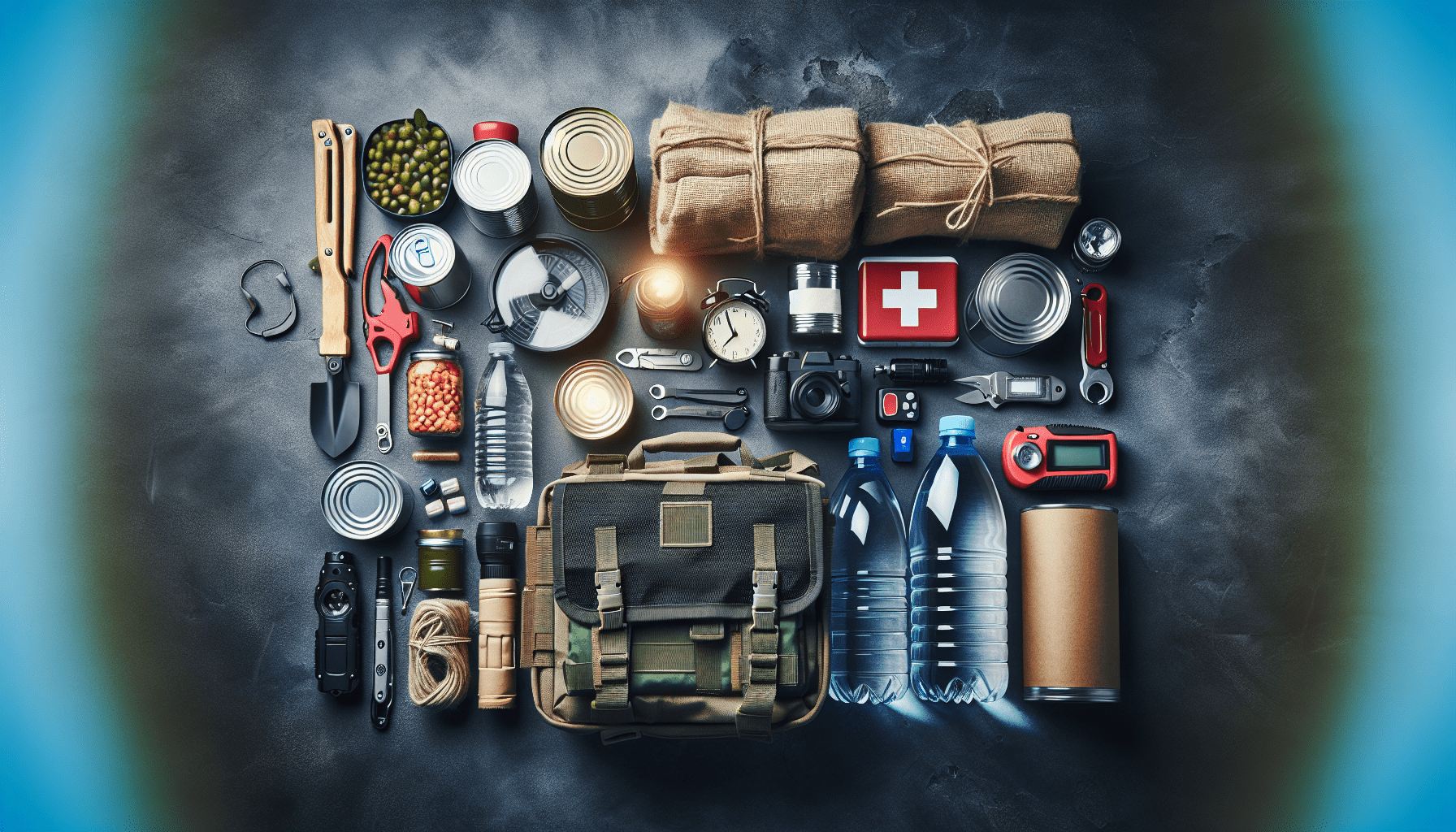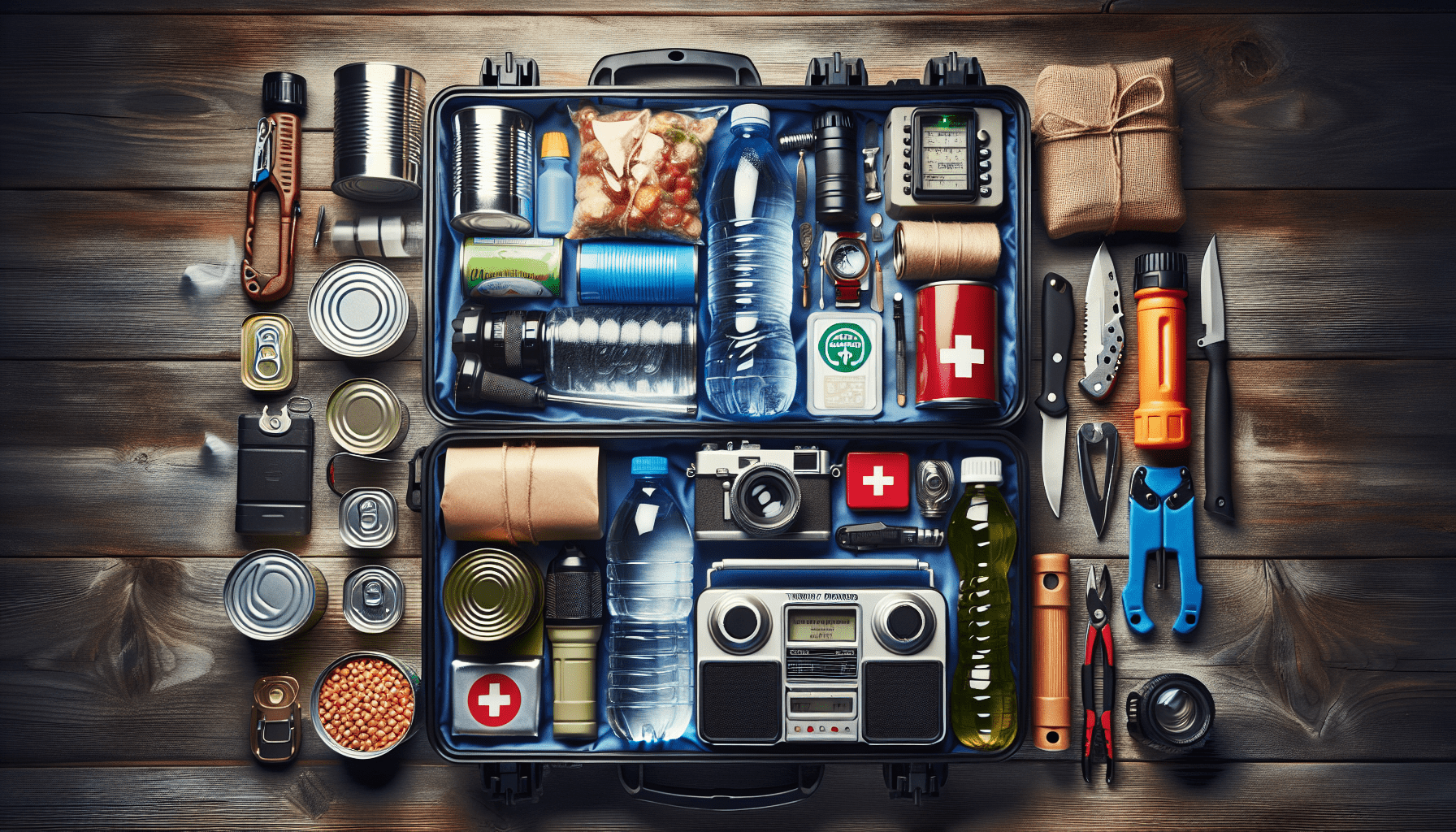Are you concerned about the rising threat of terrorist attacks and want to be prepared? Look no further! This Ultimate Guide to Prepping for Terrorist Attacks has got you covered. From practical tips on emergency planning to essential supplies and survival strategies, this comprehensive guide will empower you to safeguard yourself and your loved ones during unforeseen circumstances. Don’t let fear consume you; instead, equip yourself with the knowledge and tools necessary to face any potential threat head-on.
Emergency Communication
Establish an emergency communication plan
Having a solid emergency communication plan is crucial in times of crisis. It ensures that you can stay connected with your loved ones and get essential information during an emergency. Sit down with your family or close friends and discuss a communication protocol. Choose a primary and secondary contact person outside the affected area who can act as a point of contact for everyone. Make sure everyone knows the contact details and establish a predetermined meeting place in case you are separated. Regularly review and update your emergency communication plan to account for any changes in contact information.
Prepare a communication kit
In addition to having a communication plan, it’s important to have a well-equipped communication kit. This kit should include essential items such as a battery-powered or hand-cranked radio, extra batteries, a notepad and pens for taking notes, a whistle for signaling for help, and a flashlight. Consider including a solar charger for your electronic devices as well. Keep your communication kit in a waterproof container and make sure it’s easily accessible in case of an emergency.
Learn Morse code
While Morse code is not widely used in modern communication, it can be a useful skill to have during emergencies. Morse code allows for communication even when verbal or written communication is not possible. Take the time to learn the basics of Morse code, including the alphabet and common abbreviations. You can find online resources and mobile apps that can help you practice and improve your Morse code skills.
Invest in a satellite phone
During a terrorist attack or any large-scale emergency, traditional communication systems may become overwhelmed or fail completely. In such situations, having a satellite phone can be a lifesaver. Satellite phones operate independently of terrestrial infrastructure, allowing you to make calls and send messages even when cell towers are down. While satellite phones can be costly, their reliability during emergencies makes them worth considering as an investment for your safety and peace of mind.
Building a Safe Shelter
Assess your current shelter
The first step in building a safe shelter is to evaluate your existing dwelling. Take a walk around your home and look for any vulnerabilities. Check for structural weaknesses in the foundation, walls, and roof, as well as any potential entry points for intruders. Identifying these weaknesses will help you prioritize the necessary fortifications and improvements.
Fortify doors and windows
Securing your doors and windows is vital in preventing unauthorized entry. Reinforce door frames with sturdy materials such as metal or solid wood. Install deadbolt locks and consider adding security bars or laminated glass to windows. Don’t forget about garage doors and basement entrances, as they are often overlooked weak points. Strengthening these access points will provide an additional layer of protection.
Create a safe room
A safe room is a designated area within your home where you and your family can seek refuge during an emergency. Ideally, it should be a windowless room located on the ground floor or basement. Reinforce the walls, ceiling, and door of the safe room with sturdy materials, such as concrete or reinforced steel. Consider installing a separate ventilation system to ensure a supply of fresh air. Stock the safe room with emergency supplies, including food, water, first aid kits, and communication equipment.
Stock emergency supplies
Preparing for the worst means having ample supplies to sustain you during an emergency. Stock up on non-perishable food items, such as canned goods, granola bars, and dried fruits. Ensure you have enough water to last at least three days, at a minimum of one gallon per person per day. Don’t forget about the necessary tools and equipment, including flashlights, batteries, a multi-tool, and a fire extinguisher. Regularly check your supplies and rotate them to maintain freshness.

Self-Defense and Protection
Take self-defense classes
Taking self-defense classes can empower you with the skills and confidence to protect yourself and others in dangerous situations. Look for reputable self-defense instructors or martial arts schools in your area. These classes typically cover basic techniques for striking, blocking, and evading attacks, as well as how to assess and respond to threats effectively. Remember, self-defense is not about seeking confrontation but rather about having the knowledge and ability to defend yourself if necessary.
Purchase pepper spray or stun guns
Non-lethal self-defense tools like pepper spray or stun guns can provide an extra layer of protection. Pepper spray is a portable and easy-to-use option that can temporarily incapacitate an assailant, giving you time to escape or seek help. Stun guns deliver an electric shock and can immobilize an attacker. Before purchasing any self-defense tools, ensure that you familiarize yourself with local laws and regulations governing their use.
Invest in a firearm (if legally allowed)
For some individuals, owning a firearm may be a consideration for self-defense. However, firearm ownership is a serious responsibility that requires proper training and adherence to local laws. If you choose to own a firearm for self-defense, seek professional training to ensure you can use it safely and effectively. Store firearms securely and always follow safe handling practices. It’s essential to understand that owning a firearm carries legal, ethical, and potential safety implications.
Learn basic first aid skills
Preparing for emergencies goes beyond personal protection. Having basic first aid skills can make a significant difference in providing assistance to yourself, your loved ones, or even strangers in need. Consider taking a first aid and CPR course offered by organizations like the American Red Cross. Learn how to perform cardiopulmonary resuscitation (CPR), control bleeding, stabilize fractures, and respond to common medical emergencies. Having this knowledge will enable you to provide immediate care while you wait for professional help to arrive.
Emergency Food and Water
Stockpile non-perishable food items
During a terrorist attack or any emergency situation, access to food may be limited for an extended period. Therefore, it’s crucial to stockpile non-perishable food items to sustain yourself and your family. Include items such as canned goods, dry pasta, rice, beans, peanut butter, and energy bars in your emergency food supply. Avoid foods that require refrigeration or extensive preparation. Remember to periodically check and rotate your food supply to ensure freshness.
Store water for emergencies
Water is essential for survival, and it’s crucial to have an adequate supply in case of an emergency. Store at least one gallon of water per person per day, keeping in mind that you may need to stretch your supply for several days or longer. Use clean, food-grade containers to store water and keep them in a cool, dark area to prevent bacterial growth. Don’t forget to have a manual or battery-operated water pump and water purification tablets or filters as backup methods for obtaining safe drinking water.
Learn to purify water sources
In a prolonged emergency, your water supply may run out, and you may need to find alternative sources. Knowing how to purify water from rivers, lakes, or other natural sources is crucial. Invest in a quality water filter or learn various water purification methods, such as boiling, using iodine or chlorine tablets, or constructing a basic water filtration system. Be cautious when selecting water sources and always prioritize safety by avoiding contaminated or stagnant water.
Consider a sustainment garden
Growing your own food can provide a sustainable source of nutrition during an extended emergency. Consider creating a sustainment garden, where you cultivate vegetables, fruits, and herbs that are easy to grow and require minimal maintenance. Research suitable plants for your area and learn proper gardening techniques. By investing time and effort in your sustainment garden, you can reduce your dependence on external food sources and increase your resilience in unpredictable situations.

Survival Gear
Prepare a bug-out bag
A bug-out bag, also known as a go-bag, is a portable kit filled with essential survival items that can sustain you for at least 72 hours. Include items such as a first aid kit, water bottles, non-perishable food, a flashlight, extra batteries, a multi-tool, a portable radio, a map, a whistle, and a change of clothes. Customize your bug-out bag based on your specific needs and consider factors such as the climate and terrain of your area. Regularly check and update the contents of your bug-out bag to ensure everything is in working order and the supplies are not expired.
Gather essential survival tools
Having the right tools can greatly enhance your chances of survival during an emergency. Gather essential survival tools, such as a utility knife, a compass, a fire starter, a signal mirror, a hand-cranked charger for electronic devices, and a multi-tool with various functions. Consider investing in a portable camping stove and fuel, as it provides a reliable cooking option. Remember to pack spare batteries and ensure your tools are durable and lightweight for ease of transportation.
Include a portable water filter
Access to clean water is critical for survival, and a portable water filter can be a game-changer. Invest in a high-quality water filter or water purification straw to ensure you can drink from potentially contaminated water sources. Look for filters that remove bacteria, protozoa, and even viruses. Portable water filters are compact and lightweight, making them an essential addition to your survival gear.
Pack emergency blankets and clothing
Staying warm and dry is essential during emergencies, particularly in harsh climates or when forced to evacuate. Pack emergency blankets, also known as space blankets, as they are lightweight, compact, and can retain body heat effectively. Include extra clothing suitable for varying weather conditions, sturdy shoes, rain gear, and thermal undergarments. Opt for moisture-wicking fabrics and layer your clothing to adapt to changing temperatures. Don’t forget to pack gloves, hats, and socks for added comfort and protection.
First Aid and Medical Supplies
Assemble a comprehensive first aid kit
In emergencies, medical help may not always be immediately available, making it crucial to have a comprehensive first aid kit. Assemble a kit that includes various bandages, antiseptics, adhesive tape, scissors, tweezers, disposable gloves, sterile gauze pads, topical ointments, oral rehydration salts, and any necessary prescription medications. Include a first aid manual or pocket guide to refresh your memory on procedures and techniques. Regularly check your first aid kit and replace any expired items.
Learn basic medical skills
Being prepared goes beyond having a well-stocked first aid kit; it’s essential to have the knowledge and skills to use it effectively. Take the time to learn basic medical skills, such as how to assess and treat wounds, recognize and respond to signs of shock, manage fractures and sprains, and perform CPR and rescue breathing. Consider enrolling in a first aid or emergency medical training course offered by reputable organizations. Practice these skills regularly to maintain your proficiency.
Stock up on essential medications
If you or your family members have specific medical conditions that require regular medication, it’s crucial to stock up on essential medications. Maintain an adequate supply to last through an emergency and consider discussing contingency plans with your healthcare provider. Rotate medications regularly to avoid expiration, and keep a record of any allergies or medical conditions that may be important for emergency responders to know.
Include hygiene and sanitation items
Maintaining hygiene and sanitation is essential during emergencies to prevent the spread of diseases. Include essential items in your emergency kit, such as hand sanitizer, soap, toothbrushes, toilet paper, feminine hygiene products, and garbage bags. Consider adding a portable camping toilet or alternative sanitation solutions if access to running water or functioning plumbing is compromised. Prioritize cleanliness to ensure the well-being of yourself and those around you.

Educate Yourself
Stay informed about potential threats
Being well-informed is a key aspect of preparedness. Stay updated on potential threats and risks specific to your area and the world at large. Follow reputable news sources, government websites, and social media accounts that provide accurate and timely information. Understand the indicators of potential terrorist attacks and familiarize yourself with emergency protocols for different scenarios. By staying informed, you can make informed decisions and take appropriate actions when necessary.
Research terrorist attack scenarios
While it may be distressing to think about terrorist attack scenarios, preparing for such situations requires awareness and knowledge. Research different terrorist attack scenarios to gain an understanding of typical tactics, targets, and potential responses. This knowledge can help you develop a proactive mindset and make informed decisions to enhance your safety and survival.
Learn about emergency response protocols
Familiarize yourself with emergency response protocols, both at the individual and community levels. Understand the guidelines and procedures set forth by local authorities, emergency services, and relevant organizations. Educate yourself on evacuation routes, shelter-in-place strategies, and communication channels during emergencies. Knowing how to access and follow official guidance can minimize panic and increase your chances of staying safe during a crisis.
Understand evacuation procedures
In some situations, evacuating may be the safest course of action. Learn about evacuation procedures specific to your area, including designated evacuation routes, assembly points, and emergency shelters. Develop a plan with your family or close contacts, establishing clear communication and meeting points. Pack essential items in advance, including identification documents, emergency supplies, and important belongings. Being well-prepared for an evacuation can minimize stress and increase the efficiency of your response.
Psychological Preparedness
Develop a mindset of resilience
Emotional and psychological preparedness is just as important as physical preparedness. Developing a mindset of resilience can help you cope with the stress and uncertainty that come with emergencies. Cultivate a positive outlook and believe in your ability to overcome challenges. Develop a realistic understanding of the risks while maintaining confidence in your skills and resources. By preparing mentally and emotionally, you can better adapt and support others during difficult times.
Learn stress management techniques
Stress is an inevitable part of emergency situations, but managing it effectively is crucial for your well-being. Learn stress management techniques that work for you, such as deep breathing exercises, meditation, mindfulness, or engaging in hobbies that help you relax. Regular physical exercise can also contribute to stress reduction and overall resilience. Practice self-care and prioritize emotional well-being to optimize your ability to navigate through emergencies.
Seek professional counseling when necessary
Experiencing an emergency, especially a traumatic event like a terrorist attack, can impact mental health. If you find yourself struggling to cope, do not hesitate to seek professional counseling or therapy. A qualified mental health professional can provide support, guidance, and coping strategies to help you process and recover from the emotional aftermath of an emergency. Engaging in therapy can assist in building resilience and fostering long-term well-being.
Build a support network
Building a support network is essential for psychological preparedness. Connect with your family, friends, neighbors, and community members to create a support system. Establish open lines of communication and exchange emergency contact information. Collaborate with others to share resources, knowledge, and skills. By building a support network, you can enhance your collective resilience and create a sense of solidarity in the face of emergencies.

Backup Power and Energy Sources
Invest in a generator
During prolonged power outages, having a backup generator can provide a reliable source of electricity. Invest in a generator that suits your power needs and budget. Consider the fuel type, capacity, and noise level of the generator before purchasing. Properly install and maintain the generator according to manufacturer guidelines and local regulations. Having a generator can ensure continued power supply for essential equipment and devices, such as medical equipment or refrigeration.
Store extra fuel safely
If you own a generator or other fuel-powered devices, it’s essential to have a safe and sufficient fuel supply. Store extra fuel in approved containers designed for the specific fuel type. Ensure that the storage area is well-ventilated and away from any potential ignition sources. Regularly check and rotate your fuel supply to maintain freshness. Familiarize yourself with proper fuel storage and handling practices to prevent accidents or spills.
Explore solar or wind power options
Renewable energy sources, such as solar or wind power, can provide sustainable and environmentally friendly alternatives for backup energy. Consider investing in solar panels or a wind turbine to harness natural energy and convert it into electricity. These systems can charge batteries, power electronic devices, or even provide electricity for small appliances. Consult with professionals to determine the feasibility and cost-effectiveness of incorporating renewable energy solutions into your emergency preparedness plan.
Have backup battery packs for electronic devices
In today’s digital age, electronic devices play a crucial role in communication and accessing information. Ensure that you have backup battery packs or power banks to charge your electronic devices during emergencies. Look for high-capacity battery packs that can provide multiple charges and support various devices. Remember to periodically recharge the backup battery packs to ensure they are ready for use when needed.
Community Involvement
Join a neighborhood watch program
Being an active member of your community can significantly contribute to overall safety and preparedness. Consider joining a neighborhood watch program to collaborate with your neighbors in monitoring and reporting suspicious activities. Participate in regular meetings and training sessions to stay informed about local security concerns and learn effective crime prevention strategies. By working together, you can create a stronger and more resilient community.
Participate in emergency response trainings
Emergency response trainings offer practical skills and knowledge that can be invaluable during crisis situations. Look for local training programs offered by emergency management agencies, community organizations, or the Red Cross. These courses may cover topics such as CPR and first aid, disaster response, search and rescue techniques, and basic fire safety. By participating in these trainings, you can acquire the skills needed to take immediate action and help others in times of need.
Connect with local law enforcement
Establishing a connection with local law enforcement can foster a sense of security and facilitate effective communication during emergencies. Attend community events or meetings organized by law enforcement agencies to learn about their resources and services. Consider inviting law enforcement representatives to speak at neighborhood gatherings to provide guidance on safety and emergency preparedness. Building a positive relationship with law enforcement can enhance community collaboration and ensure a timely response during critical situations.
Organize disaster preparedness events
Take the initiative to organize disaster preparedness events in your community. These events can range from simple neighborhood meetings to larger-scale workshops or training sessions. Invite local emergency management professionals, first responders, and subject matter experts to share their knowledge and expertise. Encourage neighbors and community members to participate actively and discuss emergency plans, share resources, and exchange ideas. By promoting community-wide preparedness, you contribute to a safer and more resilient society.
In conclusion, being prepared for terrorist attacks and other emergencies requires a comprehensive approach that encompasses various aspects of safety and survival. By following the steps outlined in this guide, you can enhance your readiness to face unexpected events. Remember, preparedness is an ongoing process, and regularly reviewing and updating your plans, supplies, and skills is essential. Stay informed, stay proactive, and invest in your safety and the well-being of your loved ones.

